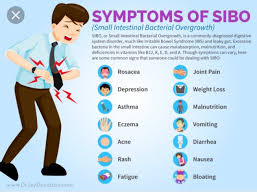Common Symptoms of SIBO
SIBO symptoms vary from person to person depending on the type of bacterial overgrowth and gas production involved. Typical signs include:
- Chronic diarrhoea or constipation
- Alternating bowel habits between diarrhoea and constipation
- Abdominal cramping and pain
- Bloating, wind, and excessive gas
- Burping and acid reflux (GERD)
- Food sensitivities and intolerances
- Joint pain and systemic inflammation
- Skin rashes or conditions such as acne and rosacea
- Iron and vitamin B12 deficiency
- Respiratory symptoms such as asthma or chronic cough
For a deeper understanding, visit SIBO Test – What Is SIBO?.
SIBO Questions and Answers
Q: Why do some people with SIBO have constipation, while others have diarrhoea?
A: SIBO is a broad term covering bacterial and archaeal overgrowth in the small intestine. The two main gases tested during breath tests are hydrogen and methane:
- High methane gas levels are typically associated with constipation-dominant SIBO.
- High hydrogen gas levels are often linked to diarrhoea-dominant SIBO.
- Elevated both gases can cause alternating bowel habits (constipation and diarrhoea).
- Some cases may involve hydrogen sulphide-producing bacteria, which can affect bowel motility and cause either diarrhoea or constipation, though this type is not yet widely tested.
Q: Is the treatment the same for all types of SIBO?
A: No. The treatment approach varies depending on the dominant gas type—hydrogen, methane, or hydrogen sulphide. Accurate testing is essential to determine which organisms are involved and to tailor your treatment plan effectively.
Q: Can long-term use of reflux medication like Nexium contribute to SIBO?
A: Yes. Proton Pump Inhibitors (PPIs) such as Nexium reduce stomach acid production. While these medications relieve reflux, long-term use decreases your body’s ability to digest food properly and kill harmful bacteria entering through food or water Yeezys - Jordans, Musee-jacquemart-andre News, Jordan Essentials Statement Hoodie - release dates & nike.. This reduction in stomach acid (hypochlorhydria) can promote bacterial overgrowth in the small intestine, leading to bloating, gas, and nutrient deficiencies.
Stomach acid plays a vital role in:
- Breaking down food and stimulating digestive enzymes nike revolution 7 from the pancreas
- Promoting bile release for fat digestion
- Absorbing nutrients such as vitamin B12, iron, zinc, calcium, and magnesium
- Protecting against pathogens and harmful microbes
Emerging studies also suggest potential links between long-term PPI use and conditions such as Alzheimer’s disease and chronic nutrient deficiency.
Learn More About SIBO
Watch this informative overview about SIBO and its impact on digestive health:

